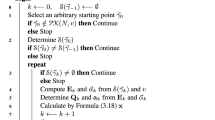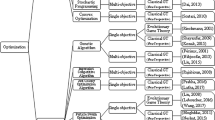Abstract
We derive two hardness results on stable winning coalitions in Gamson’s game. First, it is coNP-complete to decide whether there exists a stable winning coalition that is connected. Secondly, it is \(\Delta _2\)P-complete to decide whether there exists a stable winning coalition that includes a weakest player. Our results precisely pinpoint the computational complexity of both problems, and they indicate a negative answer to a recent question of Le Breton et al. (2008, Soc Choice Welf 30:57–67).


Similar content being viewed by others
References
Banerjee S, Konishi H, Sönmez T (2001) Core in a simple coalition formation game. Soc Choice Welf 18:135–153
Bogomolnaia A, Jackson MO (2002) The stability of hedonic coalition structures. Games Econ Behav 38:201–230
Le Breton M, Ortuño-Ortin I, Weber S (2008) Gamson’s law and hedonic games. Soc Choice Welf 30:57–67
Buss SR, Hay L (1988) On truth-table reducibility to SAT and the difference hierarchy over NP. Conference on computational complexity (CoCo’1988), 224–233
Gamson WA (1961a) A theory of coalition formation. Am Sociol Rev 26:373–382
Gamson WA (1961b) An experimental test of a theory of coalition formation. Am Sociol Rev 26:565–573
Garey MR, Johnson DS (1979) Computers and intractability: a guide to the theory of NP-completeness. Freeman, San Francisco
Greenberg J, Weber S (1986) Strong tiebout equilibrium under restricted preferences domain. J Econ Theory 38:101–117
Krentel MW (1988) The complexity of optimization problems. J Comput Syst Sci 36:490–509
Papadimitriou CH (1984) On the complexity of unique solutions. J ACM 31:392–400
Papadimitriou CH (1994) Computational complexity. Addison-Wesley, Boston
Acknowledgments
We thank two reviewers for a careful reading of the text and for providing many helpful comments that improved the presentation of the paper. Part of this research was conducted while the authors were visiting TU Graz, and both authors acknowledge support by the Doctoral College in Discrete Mathematics (grant W1230, Austrian Science Fund FWF). Vladimir Deineko acknowledges support by Warwick University’s Centre for Discrete Mathematics and Its Applications (DIMAP). Gerhard Woeginger acknowledges support by DIAMANT (a mathematics cluster of the Netherlands Organization for Scientific Research NWO), and by the Alexander von Humboldt Foundation, Bonn, Germany.
Author information
Authors and Affiliations
Corresponding author
Rights and permissions
About this article
Cite this article
Deineko, V.G., Woeginger, G.J. Two hardness results for Gamson’s game. Soc Choice Welf 43, 963–972 (2014). https://doi.org/10.1007/s00355-014-0819-6
Received:
Accepted:
Published:
Issue Date:
DOI: https://doi.org/10.1007/s00355-014-0819-6




